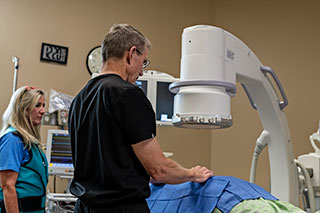
“Pain management” is defined as the treatment strategies used to reduce or reverse the effects of pain in order to improve quality of life. As a medical specialty, pain management can take many forms, and is often a collaborative effort between many medical specialists and a patient’s primary medical care provider — this group is often referred to as an “interdisciplinary pain management team,” and is sometimes necessary to not only treat a patient’s pain, but the underlying medical cause of that pain.
Pain Assessment
The first step in effective management of pain is to properly and thoroughly assess the nature of the pain, its extent, and its most likely cause. Pain management specialists have many tools at their disposal for pain assessment, including detailed interviews, numbered or visual scales, and external and internal imaging techniques, including X-rays, MRI’s and fluoroscopy. Identifying any neurological, muscular and motor impairments can also be helpful in assessing pain.
Pain Management Strategies
There are many kinds of pain management strategies that may be recommended to a patient, depending on the kind, severity and complexity of the pain experienced. Some of these strategies include:
- Pharmacological Therapy: This pain management strategy includes any treatment of pain with drugs, such as normal analgesics and painkillers, but also dermal patches, ointments, anticonvulsants, muscle relaxers and more.
- Interventional Therapy: This pain management strategy centers around intervening between the area of the body causing the pain and the patient’s brain, usually through blocking nerve impulses by way of an injection or pump. Interventional therapies are minimally invasive but are usually reserved for cases when pharmacological therapy proves insufficient.
- Alternative Therapy: This pain management strategy includes roughly any treatment that does not fit the other categories, such as nerve stimulation. Electrical stimulation of the spinal cord or peripheral nerves in order to ‘override’ the pain signals being delivered has been shown to be a viable route to alleviate or even eliminate pain in some cases. As another example, Botox® has sometimes been used to temporarily degrade the connection between muscles and nerve cells and can have a positive effect on patients with migraines, headaches and neck pain.
If you have pain that is affecting your daily life, call us at Total Pain Care for an appointment at 601-482-9224.